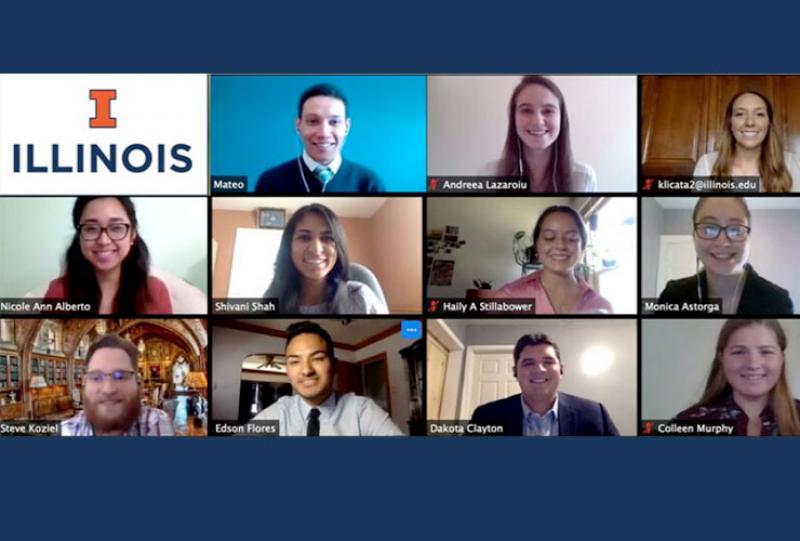
MPH students adapt, adjust to COVID-changed internships
Eleven students in the Master of Public Health program in the College of Applied Health Sciences saw their Applied Practice Experiences this summer upended because of the COVID-19 pandemic.
But when they delivered their final reports on both their APEs and their integrated learning experiences (ILE) on Aug. 7 in a Zoom call with MPH interim director Justine Kaplan, they all spoke of perseverance, patience and making the most of their revamped opportunities.
For example, Stacia Simmons expected to work in the Narcan and PrEP program at the Champaign-Urban Public Health Department, which helps prevent people from overdosing on opioids. However, when the pandemic shut everything down, Simmons was told her role would shift to remote, and she’d be working as a COVID-19 contact tracer. Additionally, she was offered remote work with the Howard Brown Health Center in Chicago as a contact tracer. Although she was disappointed not to be working on site, she found positives in her new roles.
“My experience has been amazing in that the work that I am doing directly aligns with my career interest, which is infectious disease prevention/treatment,” she said. “Being able to gain firsthand public health experience and to also be able to do my part in helping stop the spread of COVID-19 has been wonderful. It is also great in that working for two different health departments allows me to serve two different populations and it’s also very interesting to see the differences in approach in regard to the roles of contact tracers between both health departments. Overall, it’s a blessing to be interning at both departments.”
Monica Astorga also ended up working at Howard Brown remotely, although she lives in Chicago. Astorga had hoped to work on site with MPH alumna Anais Cotillas, who is a diabetes case manager, but COVID-19 had other plans.
“I was supposed to be helping Anais work with her diabetes expertise,” Astorga said, about a survey assessment Cotillas is working on. “And of course everything got changed. I was just working remotely all the time. I was looking forward for it to be more hands-on and in person. But I'm still very grateful. I learned a lot. It was completely not what I expected that I was going to do, but I enjoyed it nonetheless.”
Kelly Licata was looking forward to the face-to-face interaction of her internship at Aging Care Connections in La Grange, Ill. Luckily for Licata, she was still able to work for Aging Care, but had to do it from home because of the pandemic.
“I did not expect to be doing my internship remotely,” she said. “I was expecting the immersive experience of working in the office, full-time, sitting in on meetings and programs that I get to learn from. But seeing as Aging Care Connections works with a much higher-risk population, everything (was) moved to online resources and (I interacted) with clients via Zoom.
Several of the students described similar undertakings, and all found themselves missing out on some of the intangible qualities of an internship.
Shivani Shah expected to work as a research intern with the South Asian heart lifestyle intervention (SAHELI) and South Asians Active Together (SAATH) studies.
“My internship was primarily outreach and education-based, which was entirely people-facing. I was looking forward to connecting with community members and hearing their stories in addition to better understanding their needs and perceptions around health. I certainly wish I had this experience, especially because participants also generally really enjoy the in-person interactions.”
Nicole Alberto was looking forward to working with the Carle Foundation. The shutdown, however, cancelled her APE, and she ended up working with former KCH teaching assistant professor Brynn Adamson as a Graduate Research Assistant of the MOVE MS program.
She was grateful to learn new skills, but admitted the loss of on-site work was disappointing.
“I really miss the bonding and social interaction in the office and out in the field,” she said.
Edson Flores worked as a research assistant for the Department of Recreation, Sport and Tourism within AHS. Like his classmates, he hoped to working in the field for 7-8 hours a day. That said, he feels like his internship allows him to exercise his knowledge.
“We are conducting bilingual cognitive interviews to increase the strength and reliability of a questionnaire targeting Mexican immigrants in the Midwest,” he said. “Previous coursework from the MPH program has taught me the influence intersectionality has on patterns and choices people make especially when it comes to the foods they consume. I am fortunate to have found a summer internship where I can use the skills I learned.”
All of the MPH students agree that what they miss most about their remote APEs was the interaction, the networking and the camaraderie of in-person internships. And their advice to students who might face similar adversity in the future was consistent: be ready for anything.
“I spoke to my classmates, we would speak to each other about any bumps on the road that we would hit, or frustrations, and we'd kind of vent to each other,” Astorga said. “So I think having a good team that you work with, or at least another person or co-worker or something that you can talk to a lot, because during a pandemic, it's a lot you're dealing with mentally, or emotionally. Everyone is going through hard times. Be patient, and be flexible. And just know, trying to remind yourself that you're doing the best you can, and that you're doing a good job.”
